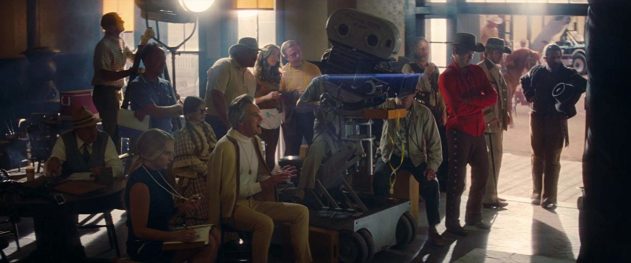OPINION – Hollywood movies and movies about Hollywood
Quentin Tarantino’s ninth film “Once Upon a Time in Hollywood” garnered four nominations at the 2020 Golden Globes, including best actor for Leonardo DiCaprio, best supporting actor for Brad Pitt and best screenplay and director for Tarantino. Many, including the director, consider this film a love letter to the end of Hollywood’s golden age told through the eyes of an actor, an actress and a stunt man. As the Golden Globes are an indicator of future awards shows, it’s likely that DiCaprio & Co. will also be vying for Oscar gold.
And yet, the actors and their director don’t make this film special on their own as much as the backdrop of where and when it takes place does. Hollywood, five decades ago. It’s easy to attribute this film to the action genre or, at this point, the “Tarantino” genre, even. But technically, it’s a period piece about Tinseltown and it’s certainly not the first.
Films about early Hollywood have been around for a while, mostly biopics of famous people. They first started getting recognition in 1992 when Robert Downey Jr. (aka “Iron Man”) starred in the film “Chaplin” about the silent movie legend, a performance which earned him a best actor Oscar nomination. In 2004, the Oscar-winning film “The Aviator,” a biopic about Hollywood producer Howard Hughes, won five Academy Awards as well as six nominations, one for DiCaprio and one for Scorsese. The latter was also nominated for best director for 2011’s “Hugo,”a film about silent film innovator George Méliès. Ironically, that same year a film about early-Hollywood won best director and best picture with Michel Hazanavicius’s “The Artist.” 2011 was also the year of “My Week with Marilyn,” a biopic of screen legend Marilyn Monroe, garnering two Oscar nominations, with best actress going to Michelle Williams for her turn in “After the Wedding” and Kenneth Branagh earning for his role in “Dunkirk” a best actor nod. In 2015 there was “Trumbo” led Bryan Cranston to get a best actor nomination.
Saïdeh Pakravan’s REVIEW of “The Artist”
More recently in 2018, the film “Stan & Ollie” explored the lives and careers of 1930s comedy legends Laurel and Hardy. Finally, this year, along with “Once Upon a Time in Hollywood,” we were treated to the film “Judy.” The biopic of a 1960s Judy Garland was snubbed at the Golden Globes but could bring an Oscar nomination to Renee Zellweger.
So why is Hollywood churning out so many films about early Hollywood? The simple answer is, Hollywood loves Hollywood. However, the deeper answer may reveal just the opposite. That maybe people find the Hollywood of the past so interesting, because the Hollywood of the present is not. In fact, one might argue that, if the stories and talent of today are so good, why are there so many films being made about the stories and talent of yesterday?
There’s no denying that the climate of today’s Tinseltown is different. For instance, many actors who put on superhero costumes become movie stars. But is it because they possess the acting abilities of Humphrey Bogart and Marlon Brando or because their films gross hundreds of millions of dollars? Of course, if it’s the latter, that may not be such a bad thing. Making money is what enables Hollywood to continue making films, but has the industry sacrificed art in the process? Perhaps the only way to truly and fairly determine the answer is to look into the future, to see if in fifty years, movies will be made about this era of Hollywood (although I doubt it’ll be that long before a mini-series about Harvey Weinstein sees the day).
In the meantime, Tinseltown continues to embrace and richly reward its roots. Possibly seeing films about the past could influence films of the future. If that’s the case, in 2069 we could see a biopic of Quentin Tarantino. The big question now is will it feature a scene of him winning an Oscar for “Once Upon a Time in Hollywood”?
news via inbox
Nulla turp dis cursus. Integer liberos euismod pretium faucibua



